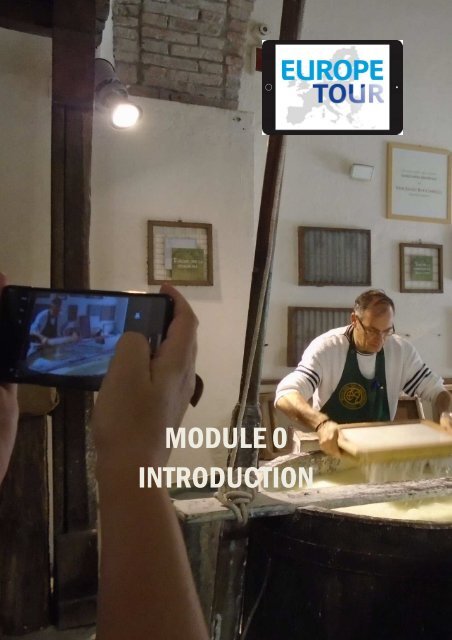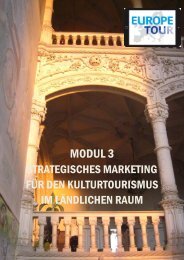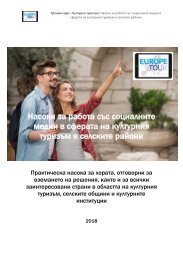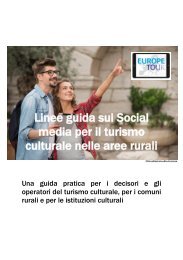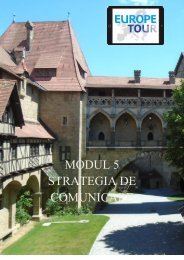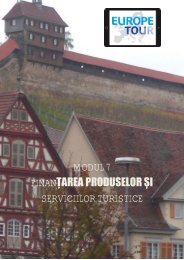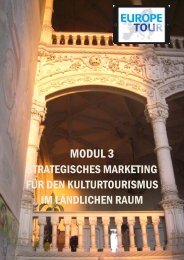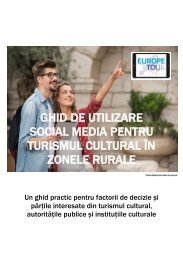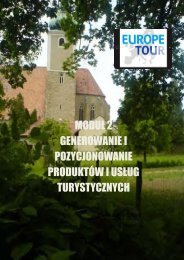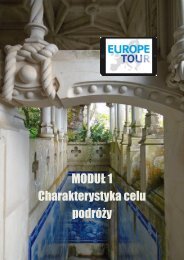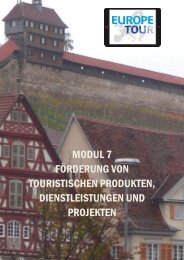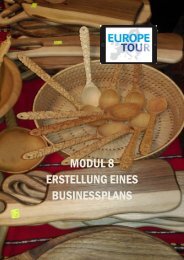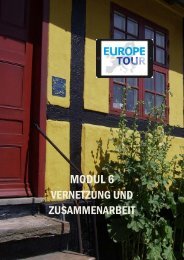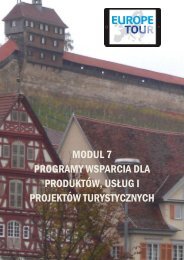Module_0_Introduction_to_Training_Modules
Create successful ePaper yourself
Turn your PDF publications into a flip-book with our unique Google optimized e-Paper software.
MODULE 0<br />
INTRODUCTION
CULTURAL TOURISM TRAINING COURSE<br />
MODULE 0 - INTRODUCTION<br />
This <strong>Training</strong> <strong>Module</strong> is part of the Cultural Toursim <strong>Training</strong> Course which has been developed within<br />
the Erasmus+ Strategic Partnership EUROPETOUR, a European initiative aimed at unlocking the economic<br />
potential of Europe’s outstanding cultural treasures and empowering rural areas <strong>to</strong> harvest the<br />
potential of cultural <strong>to</strong>urism.<br />
You can find more information at the homepage: http://www.europe<strong>to</strong>ur.tips<br />
Picture: Wolfgang Eisenreich<br />
This work is licensed under a Creative Commons Attribution-NonCommercial-ShareAlike 4.0 International<br />
License.t<br />
You are free <strong>to</strong>:<br />
• share — copy and redistribute the material in any medium or format<br />
• adapt — remix, transform, and build upon the material<br />
under the following terms:<br />
• Attribution — You must give appropriate credit, provide a link <strong>to</strong> the license, and indicate if<br />
changes were made. You may do so in any reasonable manner, but not in any way that<br />
suggests the licensor endorses you or your use.<br />
• NonCommercial — You may not use the material for commercial purposes.<br />
• ShareAlike — If you remix, transform, or build upon the material, you must distribute your<br />
contributions under the same license as the original.<br />
The European Commission support for the production of this publication does not constitute an endorsement of the contents which<br />
reflects the views only of the authors, and the Commission cannot be held responsible for any use which may be made of the information<br />
contained therein.<br />
Project number: 2015-1-DE02-KA202-002325<br />
2
CULTURAL TOURISM TRAINING COURSE<br />
MODULE 0 - INTRODUCTION<br />
Cultural <strong>to</strong>urism in rural areas - opportunities and peculiarities<br />
Hardly any part of the <strong>to</strong>urism economy has developed as fast as cultural <strong>to</strong>urism in the past decade.<br />
In the meantime, it is one of the few growth areas of <strong>to</strong>urism demand at all, as one of the<br />
"megatrends" in <strong>to</strong>urism.<br />
Nevertheless, cultural <strong>to</strong>urism is not the same as cultural <strong>to</strong>urism: European cities have long since set<br />
out <strong>to</strong> systematically open up the cultural <strong>to</strong>urism market. Metropolitan regions focus their urban<br />
development on their cultural offers and the accompanying <strong>to</strong>urism. Its ac<strong>to</strong>rs are highly networked<br />
with institutions of the local economy and coordinate activities and offers.<br />
However, the large-<strong>to</strong>wn concepts in the organization of cultural <strong>to</strong>urism cannot easily be transferred <strong>to</strong><br />
rural areas because the prerequisites are different there:<br />
• A sensitized environment is scarce; cultural <strong>to</strong>urism is often not (yet) perceived as an<br />
economic fac<strong>to</strong>r.<br />
• The data is usually rudimentary; data on cultural <strong>to</strong>urism is not systematically recorded and<br />
analyzed.<br />
• There is a lack of qualified ac<strong>to</strong>rs who promote cultural <strong>to</strong>urism on the spot and understand<br />
themselves as "ambassadors" of their region.<br />
• Service providers (cultural institutions, accommodation providers, gastronomy ...) remain passive<br />
and expect "full service" from the local <strong>to</strong>urism offices.<br />
• Tourism officers know <strong>to</strong>o little about the functioning of cultural institutions.<br />
• Professionally controlled and economically oriented networks are missing.<br />
• Especially small municipalities are often located in rural areas with comparatively low<br />
population density, which places more complex demands on communication processes and<br />
logistics than in urban densified centers.<br />
• Places of cultural communication are less frequent, they have <strong>to</strong> be organized often (for<br />
example through events), and while in large cities such places (cafés, etc.) are a natural<br />
infrastructure.<br />
Beside these barriers, we already know a lot about the guest characteristics and guest expectations of<br />
cultural experiences in rural areas:<br />
• Cultural-minded guests are an economically interesting target group for rural areas with high<br />
purchasing power, above-average education and high added value.<br />
• The 50+ age group predominates, but also with families with children, cultural offers (especially<br />
as bad weather offers) are high in the guests' favor.<br />
• Culture is not equated with high culture. More important than the visit of museums is the visit<br />
of cultural heritage sites and the learning of cus<strong>to</strong>ms, traditions and regional peculiarities.<br />
• Authenticity, regionalism, contact with land and people play an important role. The culinary<br />
experience is also highly valued in connection with the products of his<strong>to</strong>ric cultural landscapes.<br />
• Cultural <strong>to</strong>urists want <strong>to</strong> immerse themselves in cultural landscapes, not only by visiting sites<br />
or museums, but also by meeting people and by being personally enriched by authentic<br />
experiences.<br />
3
CULTURAL TOURISM TRAINING COURSE<br />
MODULE 0 - INTRODUCTION<br />
What enables and promotes successful and sustainable cultural<br />
<strong>to</strong>urism initiatives in rural areas?<br />
1. A climate of recognition and support<br />
Everywhere where culture is recognized as a value, where there is a political commitment, economic<br />
effects can also be achieved.<br />
2. Willingness <strong>to</strong> cooperate<br />
Cultural <strong>to</strong>urism aims at cooperation in different fields of activity. In other words, the institutions of<br />
local and regional <strong>to</strong>urism promotion, as well as municipal politics and administration, are among the<br />
decisive partners in addition <strong>to</strong> cultural and <strong>to</strong>urism-related businesses (gastronomy, hotel industry,<br />
retail trade, sports and leisure,<br />
3. Economically oriented networks, which are applied across all sec<strong>to</strong>rs and give local<br />
ac<strong>to</strong>rs participation and design possibilities<br />
Successful economic initiatives usually involve long-standing networks or talented networkers, who pool<br />
resources and interpret networking for mutual support.<br />
4. Professionalism<br />
Cultural <strong>to</strong>urism requires professional qualifications (in <strong>to</strong>urism, network management, sensitivity <strong>to</strong><br />
culture) and social skills (communication skills, endurance, frustration <strong>to</strong>lerance). Particularly economic<br />
networks are not <strong>to</strong> be organized "by the way", but need <strong>to</strong> be implemented by professionals.<br />
5. Integration of innovative technologies<br />
Guests bring their everyday experiences with them on holiday and use their mobile devices such as<br />
tablets and smartphones, of course, even in their spare time. In order <strong>to</strong> "pick them up" there,<br />
corresponding services such as apps, QR codes and not a supplementary offer, but are self-evident.<br />
6. Use of social networks<br />
Facebook, Twitter, Instagram, Snapchat and Co can be valuable helpers in the cultural <strong>to</strong>urism<br />
community, especially in the development of communities that inform each other - and also require<br />
complaints management. This is particularly true for professionalism and the provision of appropriately<br />
trained personnel.<br />
4
CULTURAL TOURISM TRAINING COURSE<br />
MODULE 0 - INTRODUCTION<br />
7. Individual offers, based on existing traditions of the rural environment<br />
Examples include the rediscovering and revitalization of old handicraft techniques in the arts (porcelain<br />
and ceramic production, jewelry design, glass blowing, hand weaves, fabric dyes), or creative offers that<br />
use rural resources (an example of this are the trendy wood sculpture courses for the design of largeformat<br />
wooden sculptures with mo<strong>to</strong>r saws).<br />
8. High fun fac<strong>to</strong>r and social life<br />
Cultural <strong>to</strong>uristic activities in the countryside are usually not based on cultural awareness, but on the<br />
fact that people enjoy each other and social life is enriched.<br />
9. Time and patience<br />
Cultural <strong>to</strong>uristic projects in rural areas often develop out of the logic of temporary support projects,<br />
which are the order in urban cultural work, where projects are fostered by funding. Their sustainability<br />
is due <strong>to</strong> the fact that the ac<strong>to</strong>rs can escape a given project duration and control the use of<br />
resources according <strong>to</strong> their own temporal possibilities. This means things can grow slowly.<br />
10. Voluntary work and the possibility (also) of short-term commitment<br />
Club life is a great strength of rural life. Even if the participation in club life and the assumption of<br />
responsibility in club structures are becoming less and more difficult <strong>to</strong> implement, the willingness <strong>to</strong><br />
engage is unbroken. Voluntary commitment is undeniably a high value and part of rural selfunderstanding.<br />
Time-limited tasks also help in the implementation of guest-oriented offers in cultural<br />
<strong>to</strong>urism.<br />
11. Qualification for rural cultural <strong>to</strong>urism<br />
Cultural <strong>to</strong>urism needs qualification. This can be learned and trained. EUROPETOUR developed a<br />
training program that is open <strong>to</strong> all interested parties in cultural <strong>to</strong>urism. In eight training modules the<br />
basic requirements for cultural <strong>to</strong>urism in rural areas can be learned.<br />
5
CULTURAL TOURISM TRAINING COURSE<br />
MODULE 0 - INTRODUCTION<br />
Why training for cultural <strong>to</strong>urism?<br />
Cultural <strong>to</strong>urism in rural areas is a chance for raising awareness and generating employment, income<br />
and better living conditions. However, cultural <strong>to</strong>urism for rural areas has not reached a level of<br />
professional qualification and communication that is comparable <strong>to</strong> cultural <strong>to</strong>urism in urban areas. The<br />
need for qualification is obvious – likewise for voluntary and professional ac<strong>to</strong>rs from culture, <strong>to</strong>urism<br />
and all kind of service providers offering <strong>to</strong>urism services, accommodation, gastronomy, transportation,<br />
farms, cultural institutions etc.<br />
Ac<strong>to</strong>rs from culture and <strong>to</strong>urism are usually not trained <strong>to</strong> work <strong>to</strong>gether; they “speak very different<br />
languages”. Cooperation is therefore a major issue for <strong>to</strong>urism providers and especially people working<br />
in rural cultural institutions. They need good training materials in order <strong>to</strong> improve their skills in the<br />
development and positioning of their cultural-<strong>to</strong>uristic products and services, in marketing, sales<br />
channels, financial planning and finally business development. To cut a long s<strong>to</strong>ry short: this is <strong>to</strong><br />
make use of an enormous potential which rural areas have <strong>to</strong> offer!<br />
The Europe<strong>to</strong>ur <strong>Training</strong> Course<br />
In order <strong>to</strong> meet the demand for training the most relevant issues, EUROPETOUR developed a multilingual<br />
training course, containing a set of eight modules that cover the following <strong>to</strong>pics:<br />
• M1 Destination characterization (strength & weaknesses, <strong>to</strong>urism policies, data analysis)<br />
• M2 Development and positioning of <strong>to</strong>uristic products and services (target groups, partners,<br />
outreach)<br />
• M3 Marketing strategy and planning (instruments, evaluation)<br />
• M4 Distribution and sales channels (sales partners of cultural <strong>to</strong>uristic products)<br />
• M5 Communication strategy and planning (PR, social media, press relations, data analysis)<br />
• M6 Networking and Cooperation (identification of stakeholders, development of network<br />
infrastructure)<br />
• M7 Financial planning (access <strong>to</strong> funding, funding models, funding skills)<br />
• M8 Development of a business plan<br />
Do you want <strong>to</strong> know if this training is for you?<br />
This course is of interest for everybody working in the cultural and <strong>to</strong>urism sec<strong>to</strong>r in rural areas:<br />
• small and medium size museums and collections that focus on the local environment and<br />
his<strong>to</strong>ry<br />
• volunteers working in cultural institutions<br />
• amateur theatres and orchestras<br />
• poets<br />
6
CULTURAL TOURISM TRAINING COURSE<br />
MODULE 0 - INTRODUCTION<br />
• his<strong>to</strong>rians<br />
• <strong>to</strong>ur guides<br />
• creative artists<br />
• art & crafts manufacturers<br />
• opera<strong>to</strong>rs of farm shops, culinary manufac<strong>to</strong>ries…<br />
This training is also aimed at employees in regional or local <strong>to</strong>urist agencies and municipalities but<br />
have other professional background, e.g. in public administration.<br />
You certainly have outstanding knowledge in your field of work. However, maybe your specific<br />
knowledge and skills for cultural <strong>to</strong>urism are not well developed. This is why EUROPETOUR offers you<br />
such knowledge, because international competition in the cultural <strong>to</strong>urism sec<strong>to</strong>r is getting more and<br />
more intense.<br />
We know that your work is labour-intensive and time consuming, therefore we have designed the<br />
materials for distance-learning: You can adjust your learning <strong>to</strong> your own schedule, and you will not<br />
come under pressure <strong>to</strong> fulfil certain modules within a tight time-frame.<br />
How is the EUROPETOUR training structured?<br />
In order <strong>to</strong> support your learning, the EUROPETOUR training program is divided in<strong>to</strong> eight <strong>Module</strong>s.<br />
Each <strong>Module</strong> represents steps for gaining all relevant knowledge for successful cultural <strong>to</strong>urism<br />
activities.<br />
You can choose yourself in which order you will complete the EUROPETOUR training program and<br />
deepen and expand your knowledge and competence.<br />
Each <strong>Module</strong> is structured along established steps. You should proceed along each <strong>Module</strong>'s content,<br />
which enhances knowledge on a bot<strong>to</strong>m up schedule.<br />
All <strong>Module</strong>s are structured alike and consist of a learning unit combined of information, an exercise, a<br />
checklist and best practices: They present know how, adjusted <strong>to</strong> the requirements of cultural <strong>to</strong>urism<br />
in rural areas and their services and products:<br />
• Information: You will be introduced in<strong>to</strong> the module.<br />
• Exercises: In a short exercises you will reflect on the information you gained in this module.<br />
• A checklist as “How <strong>to</strong> do” unit: Here you can implement the new knowledge in<strong>to</strong> your<br />
business. You can follow a step by step-process by using the attached supporting “<strong>to</strong>ols”.<br />
• Best Practice: They will help <strong>to</strong> demonstrate examples how it can work successfully in cultural<br />
<strong>to</strong>urism, and should help <strong>to</strong> understand how the training modules can be used efficiently.<br />
7
CULTURAL TOURISM TRAINING COURSE<br />
MODULE 0 - INTRODUCTION<br />
Let’s start!<br />
Welcome <strong>to</strong> the EUROPETOUR training course! We value your motivation <strong>to</strong> extend your knowledge and<br />
expertise.<br />
You have probably been recommended by someone <strong>to</strong> have a look at the www.Europe<strong>to</strong>ur.tips<br />
webpage. Or you have found it by coincidence. There is a list of ingredients you would need <strong>to</strong> gather<br />
up in order <strong>to</strong> pass the course: It is mainly the curiosity, plenty of motivation <strong>to</strong> read, <strong>to</strong> think, <strong>to</strong><br />
observe and <strong>to</strong> try out new things.<br />
In order <strong>to</strong> make the most of the course, we have collected a few tips and suggestions for your<br />
successful learning process:<br />
Tips for your eyes<br />
• Print the <strong>Module</strong>s and other learning materials and list and browse through them until they get<br />
fingered and thumbed.<br />
• Underline important things using different colours (develop your own system for attribution of<br />
colours <strong>to</strong> diverse text elements)<br />
• Draw schemas and mind maps on posters and place them on the wall in your learning corner<br />
(or at least temporarily on<strong>to</strong> the fridge door or the bathroom door).<br />
Tips for your ears<br />
• If you are in <strong>to</strong>uch with other learners, form a learning group and meet regularly in order <strong>to</strong><br />
learn the lessons step by step. Read aloud <strong>to</strong> each other, explain your point of view and<br />
discuss as much as possible.<br />
• The majority of mobile phones or MP3 players are equipped with a recording <strong>to</strong>ol. Make your<br />
personal record reading through the chapter you have been working on. If you cannot stand<br />
your own voice, ask a friend of yours, or your husband or your children.<br />
• While learning, read your notes aloud. If itś helpful, form a short rhymes or slogans which will<br />
help you <strong>to</strong> memorize the key concepts.<br />
• Find someone who would be interested in the <strong>to</strong>pic and at the end of each unit explain <strong>to</strong><br />
him/her the basics you have learned.<br />
Tips for the rest of your senses<br />
• Try <strong>to</strong> get as complex a picture as possible. Going through the exercises, there will be many<br />
tasks <strong>to</strong> fulfill outdoor. Collect impressions and always involve all of your senses.<br />
• If a particular paragraph in the learning materials rings the bell and reminds you at a real life<br />
situation or an example from your surroundings, link this idea with the text and put down a<br />
clear note.<br />
• Throw an experimental party for a few friends and ask them <strong>to</strong> help you with the exercises.<br />
Try out as many things as possible, including role play which is the best way <strong>to</strong> learn things<br />
intensively. Furthermore, two heads are better than one, and four heads are better than two.<br />
• Link the learning with your daily routine. While shopping do the homework for various lessons.<br />
You do not need <strong>to</strong> organize extra trips <strong>to</strong> fulfil the tasks described in the exercises. There is<br />
8
CULTURAL TOURISM TRAINING COURSE<br />
MODULE 0 - INTRODUCTION<br />
an old wisdom saying: „The one who asks, learns and explores may look stupid for a second.<br />
The one who does not do that, stays stupid forever. “<br />
Tips for your general learning progress<br />
• Divide the learning units in<strong>to</strong> small bits and pieces. At the beginning you might be very<br />
motivated with a lot of appetite for new things and experience. However, sometimes <strong>to</strong>o much<br />
energy invested at the beginning means a quick tiredness and speedy slowdown, even if some<br />
units are short and comprehensible. Rather take more time for embedding the findings in<strong>to</strong><br />
your everyday practice. Discuss it with friends, family and colleagues. Incorporate the lesson<br />
learned in<strong>to</strong> your business. Let the <strong>to</strong>pic <strong>to</strong> settle down before you pass over <strong>to</strong> the next one.<br />
• Involve your „significant others“ in<strong>to</strong> your learning process, which means let all kind of people<br />
whose opinion means something <strong>to</strong> you. They may carry out various activities <strong>to</strong>gether with<br />
you. Or you may try out various versions separately and then compare the results. They might<br />
once play the part of your cus<strong>to</strong>mers, another time they might be some independent<br />
respondents or idea spenders. Anyway, the more people get involved in<strong>to</strong> your learning<br />
process, the more chances you have <strong>to</strong> incorporate the new findings in<strong>to</strong> your farming<br />
business.<br />
• Do not give up. If you get tired, take a break and come back <strong>to</strong> the course later. It would be<br />
a pity after getting involved and putting in a lot of energy. If you realize you get lazy or you<br />
lose motivation, ask friends for help or get in <strong>to</strong>uch with your national project partner. You<br />
learn for yourself!<br />
The EUROPETOUR team wishes you a lot of pleasure and success!<br />
9


